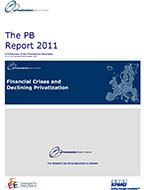PB Annual Report 2011
2011 was a year of global financial retrenchment, prompted by the emergence of multiple sovereign debt crises in Europe and the fallout from political fights over raising the U.S. federal government’s borrowing limit. These crises hit planned privatization offerings very hard, and governments raised only $94.4 billion (€68.2 billion) through divestments during 2011, less than half the record $213.6 billion (€159.9 billion) raised globally during 2010. Share issue privatizations (SIPs) accounted for roughly half (47%) of this total, far lower than usual and the three-quarter share of world privatizations SIPs accounted for in 2010, but 2011’s largest single privatization was U.S. seasoned equity offering in May. However, the overriding characteristic of 2011 as a privatization year was the exceptionally large number of failed, withdrawn, and cancelled privatization sales, which totalled at least $34.6 billion (€26.1 billion), including almost $17 billion (€12.0 billion) just from two planned Spanish offering that were cancelled within days of final launch.
Continuing a trend that has been emerging for several years, the 27 countries of the European Union accounted for a small minority of the total number and value of privatization deals worldwide during 2011. The 49 EU privatization transactions that raised $26.4 billion (€19.5 billion) in 2011 represented only 27.9% of the worldwide total, far below the long-run average EU share of 43.0%, and vastly lower than the 68.2% share of total global divestments that the EU accounted for as recently as 2008. The aggregate EU value in 2011 is also much lower than recent annual levels, which averaged over $62 billion (€46 billion) from 2004 to 2010.
In some ways, the first half of 2012 points to modestly better times ahead for governments wishing to privatize state assets. There have been three major sales thus far, all of which were executed in February or March 2012. Offering the greatest hope for the future is the large number and value of planned and pending privatization deals that seem likely to be completed in the second half of 2012 or the next few years. Most significant are the delayed but not abandoned national divestment programs that governments plan to renew once markets–and western political prospects–stabilize. Supporting this view is the fact that governments have announced plans to divest over $160 billion (€124 billion) once markets and political waters stabilize, so the immediate future looks rather bright. Longer term, the continuing fiscal crisis gripping most western countries suggests that privatization programs will remain a central issue for global finance and economics for many years to come.

